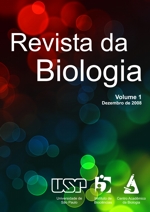If extinctions linked to climate change are natural events, why shall we worry about the current scenario?
DOI:
https://doi.org/10.11606/issn.1984-5154.v1p9-11Keywords:
Extinction, physiology, climate change, synergism.Abstract
The climate of Earth is changing in parallel to an accelerated biodiversity lost. Massive extinctions associated with climate change happened already along the history of life in the Earth. So, are we witnessing one more event of natural mass extinction? This assay aims to discuss this question.Downloads
References
Brook, B.W.; N.S. Sodhi, & J.A.C. Bradshaw. Synergies among extinction drivers under global change. Trends in Ecology and Evolution v.23 p.453-460. 2008.
Carpenter, K.E. et al. One-third of reef-building corals face elevated extinction risk from climate change and local impacts. Science v.321 p.560-563. 2008.
Crowley, T.J., North, G.R. Abrupt climate change and extinction events in Earth history. Science v.240 p.996-1002. 1988.
Hansen, J., M. Sato, R. Ruedy, K. Lo, D.W. Lea & M. Medina-Elizade. Global temperature change. Proceedings of the National Academy of Sciences USA v.103 p.14288 – 14293. 2006.
Hughes, J.B., G.C. Daily & P. R. Ehrlich. Population diversity: its extent and extinction. Science v.278 p.689-692. 1997.
Hughes, L. Biological consequences of global warming: is the signal already apparent? Trends in Ecology and Evolution v.15 p.56-61. 2000.
Lewis, O.T. Climate change, species-area curves and the extinction crisis. Philosophical Transactions of the Royal Society B-Biological Sciences v.361 p.163-171. 2006.
McLeod, N., P.F. Rawson, P.L. Forey, F.T. Banner, M.K. Boudagher-Fadel, P.R. Brown, J.A. Burnett, P. Chambers, S. Culver, S.E. Evans, C. Jeffrey, M.A. Kaminski, A.R. Lord, A.C. Milner, A.R. Milner, N. Morris, E. Owen, B.R. Rosen, A.B. Smith, P.D. Taylor, E. Urquhart & J.R. Young. The Cretaceous-Tertiary biotic transition. Journal of the Geological Society, London v.154 p.265-292. 1997.
Moller, A.P.; D. Rubolini, & E. Lehikoinen. Populations of migratory bird species that did not show a phenological response to climate change are declining. Proceedings of the National Academy of Sciences USA v.105 p. 16195-16200, 2008.
Myers, N.H. & A.H. Knoll. The biotic crisis and the future of evolution. Proceedings of the National Academy of Sciences USA v.98 p.5389-5392. 2001.
Parmesan, C. & G. Yohe. A globally coherent fingerprint of climate change impacts across natural systems. Nature v.421 p.37-42. 2003.
Pimm, S. & P. Raven. Extinction by numbers. Nature v.403 p.843-845. 2000.
Pimm, S., P. Raven, A. Peterson, C.H. Sekercioglu & P.R. Ehrlich. Human impacts on the rates of recent, present, and future bird extinctions. Proceedings of the National Academy of Sciences USA v.103 p.10941-10946. 2006.
Portner, H.O. & A.P. Farrell. Physiology and climate change. Science v.322 p.690 – 692. 2008.
Sekercioglu, C.H., H.S. Scheneider, J.P. Fay & S.R. Loarie. Climate Change, Elevational Range Shifts, and Bird Extinctions. Conservation Biology v.22 p.140-150. 2008.
Spicer, J.I. & K.J. Gaston. Physiological Diversity and its Ecological Implications. Blackwell Science, Oxford. 1999.
Thomas, C.D. et al. Extinction risk from climate change. Nature v.427 p.145-148. 2004.
Wake, D.B. & Vredenburg, V.T. Are we in the midst of the sixth mass extinction? A view from the world of amphibians. Proceedings of the National Academy of Sciences USA v.105 p.11466–11473. 2008.
Wilson, R.W. & C.E. Franklin. Testing the beneficial acclimation hypothesis. Trends in Ecology and Evolution v.17 p.66-70. 2002.
Wikelski, M. & S.J. Cook. Conservation Physiology. Trends in Ecology and Evolution v.21 p.38-46.2006.
Downloads
Published
Issue
Section
License
Copyright (c) 2008 Revista de Biologia

This work is licensed under a Creative Commons Attribution 4.0 International License.
We ensure that our journal does not retain any copyright and that these are exclusive of the author(s) of the text. In that sense, we intend to break any restrictions to the published material and to achieve more intensely our goal of communicating science.






